This post contains affiliate links.
Whether it’s made in a rice cooker, a pot on the stove, a dish in the oven, or brought home in a takeout box, rice is a staple food that is embarrassingly easy to forget on the counter overnight. Most people will dispose of the dried-out rice, but is that wasteful? Is rice left out overnight still safe to eat?
Cooked rice is not safe to eat if it has been left out overnight. Cooked rice left at room temperature for more than two hours should not be eaten, since it is an ideal environment for Bacillus cereus. Reheating it will not help. Spoiled rice is one of the top causes of food poisoning.
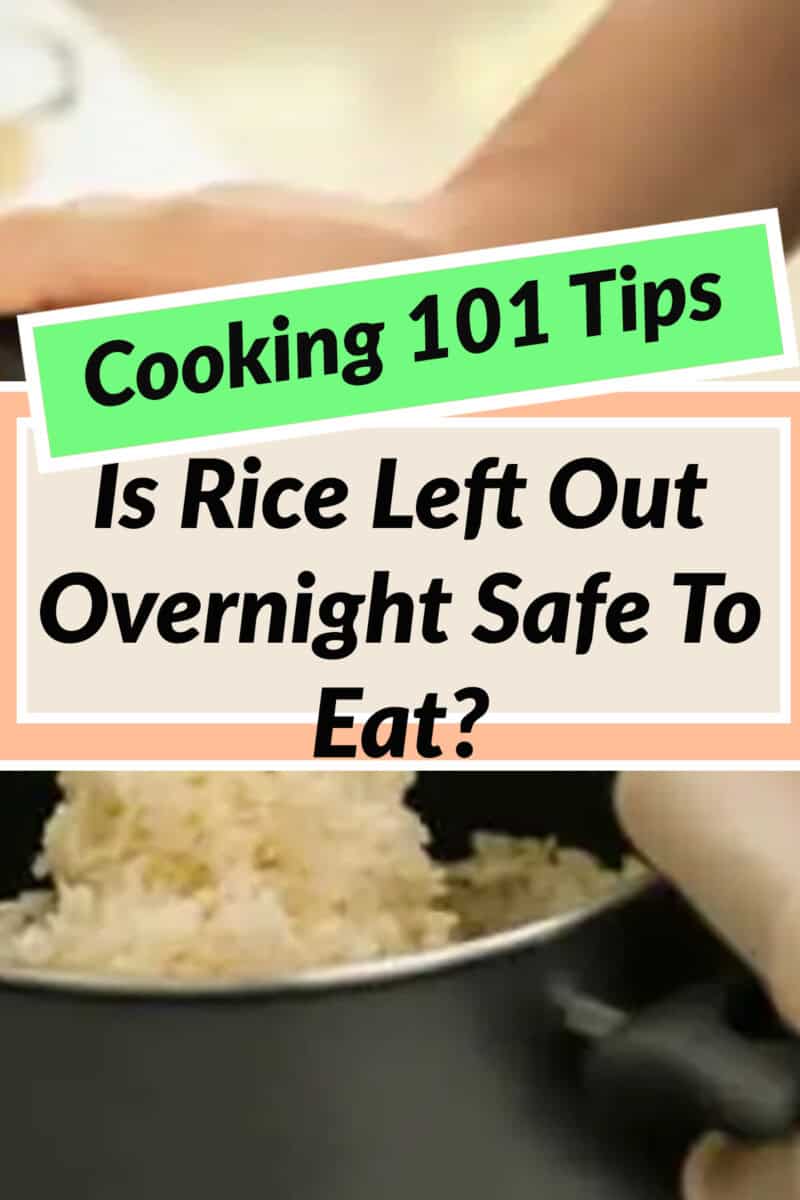
Yes, rice might be the reason you get food poisoning from that otherwise great restaurant! Even the fridge can’t keep cooked rice good for long. For more information on staying safe and keeping your rice healthy, check out the article below.
How Long Can Rice Be Left Out?
Rice has a very short lifespan outside of the fridge . This is because the moist, porous, and sugar-rich environment of rice is an ideal breeding ground for Bacillus Cereus, which causes food poisoning.
. This is because the moist, porous, and sugar-rich environment of rice is an ideal breeding ground for Bacillus Cereus, which causes food poisoning.
The clock starts ticking as soon as rice goes below the cooking temp of 140+ degrees Fahrenheit. If the rice is left at room temperature, it can stay out for up to two hours. If the temperature is above 90 degrees Fahrenheit, such as for a meal outside, the time drops down to one hour.
as soon as rice goes below the cooking temp of 140+ degrees Fahrenheit. If the rice is left at room temperature, it can stay out for up to two hours. If the temperature is above 90 degrees Fahrenheit, such as for a meal outside, the time drops down to one hour.
Sushi Rice with Vinegar
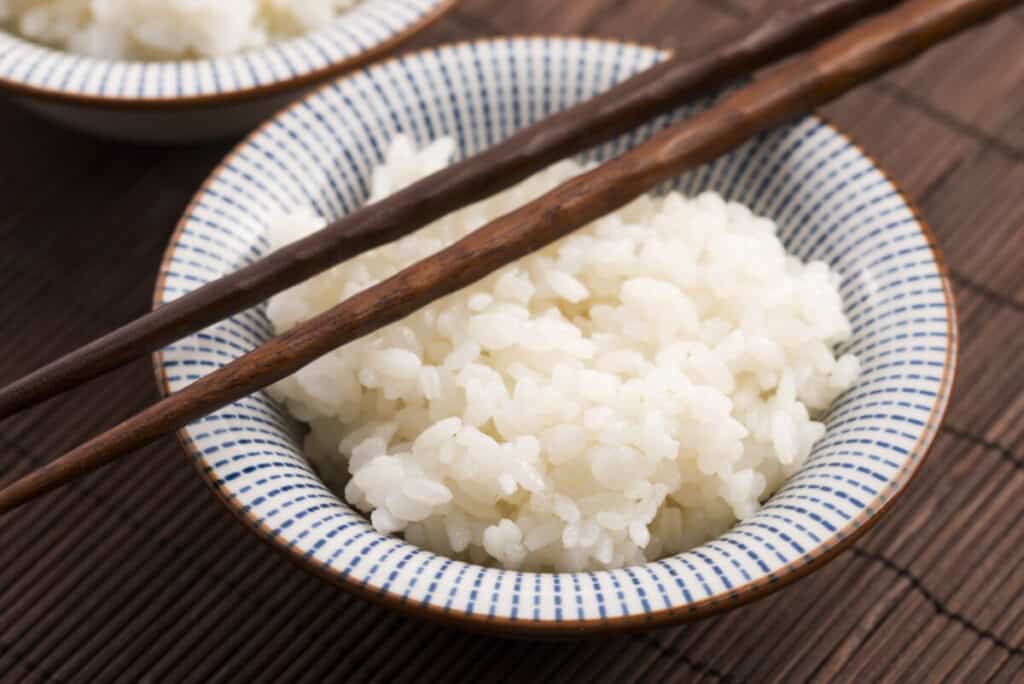
The only exception to the rice lifespan rule is fully prepared Sushi Rice , which has vinegar and salt mixed in. The vinegar inhibits bacteria growth and keeps the rice safe to eat for longer. If prepared properly, it can be left out for up to six hours. Remember that the rice itself does not have any special properties, so simply buying sushi-grade rice instead of long-grain or brown rice will not help. The vinegar mixture, added in separately from the rice, is the reason bacterial growth is slowed.
, which has vinegar and salt mixed in. The vinegar inhibits bacteria growth and keeps the rice safe to eat for longer. If prepared properly, it can be left out for up to six hours. Remember that the rice itself does not have any special properties, so simply buying sushi-grade rice instead of long-grain or brown rice will not help. The vinegar mixture, added in separately from the rice, is the reason bacterial growth is slowed.
Leaving Rice Out Overnight
With all of this information in mind, cooked rice left out overnight should absolutely never be consumed by anyone. Reheating it will not kill bacteria or the toxins they produce. Even sushi rice with vinegar will be outside of the six-hour window if left out overnight.
Soaking Uncooked Rice Overnight
Soaking uncooked rice overnight is very different from leaving cooked rice out overnight. Since the rice is not yet cooked, it is not vulnerable to many of the same bacteria that occur in cooked rice. If anything, soaking uncooked rice overnight can make it healthier, remove pollutants, and make it easier to digest. Many middle eastern and Indian recipes instruct cooks to soak their rice before cooking.
is very different from leaving cooked rice out overnight. Since the rice is not yet cooked, it is not vulnerable to many of the same bacteria that occur in cooked rice. If anything, soaking uncooked rice overnight can make it healthier, remove pollutants, and make it easier to digest. Many middle eastern and Indian recipes instruct cooks to soak their rice before cooking.
How Long Will Rice Stay Good In The Fridge?
Cooked rice loves to host bacteria, so even storing it in the fridge perfectly won’t extend its lifespan for long. All refrigerated rice should be consumed within 3-4 days of the original cooking date, and it should be reheated to 165 degrees Fahrenheit before consumption.
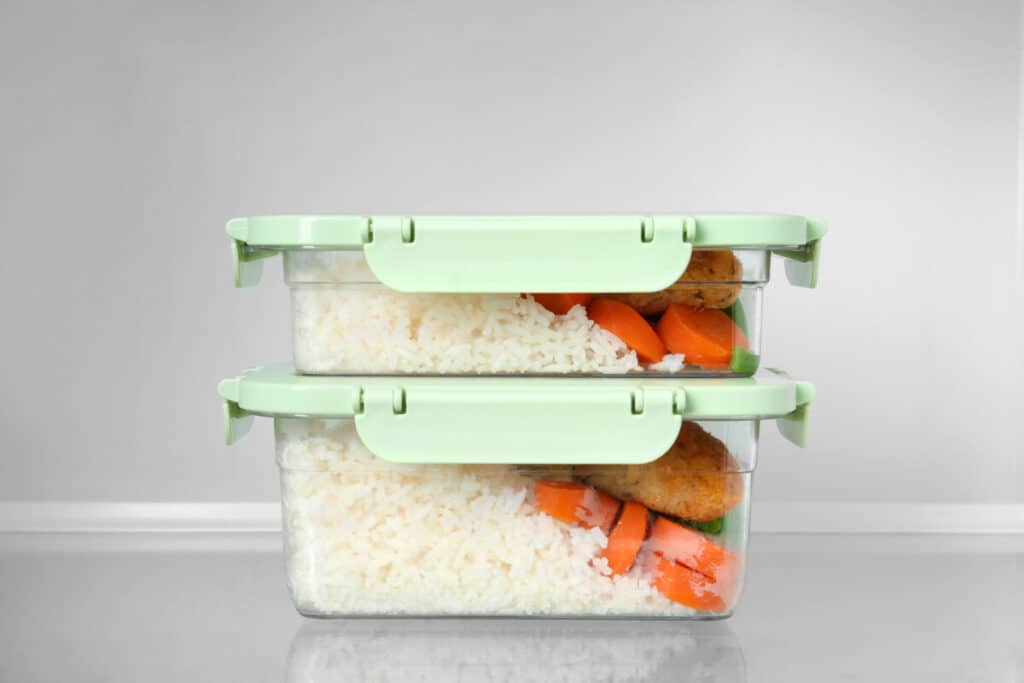
The same is true of rice that has been frozen and thawed. Freezing cooked rice does not reset the clock on the spoilage date. Rice frozen immediately after cooking and cooling should be consumed within 3-4 days of the original cooking date, as well as being fully reheated, and rice frozen after time spent in the fridge should be marked appropriately.
How Do I Keep Rice From Spoiling?
There isn’t much that can be done to save rice on the counter, but the way you handle freshly cooked rice can prevent you from getting food poisoning later on. Properly cooled and stored rice is safe rice.
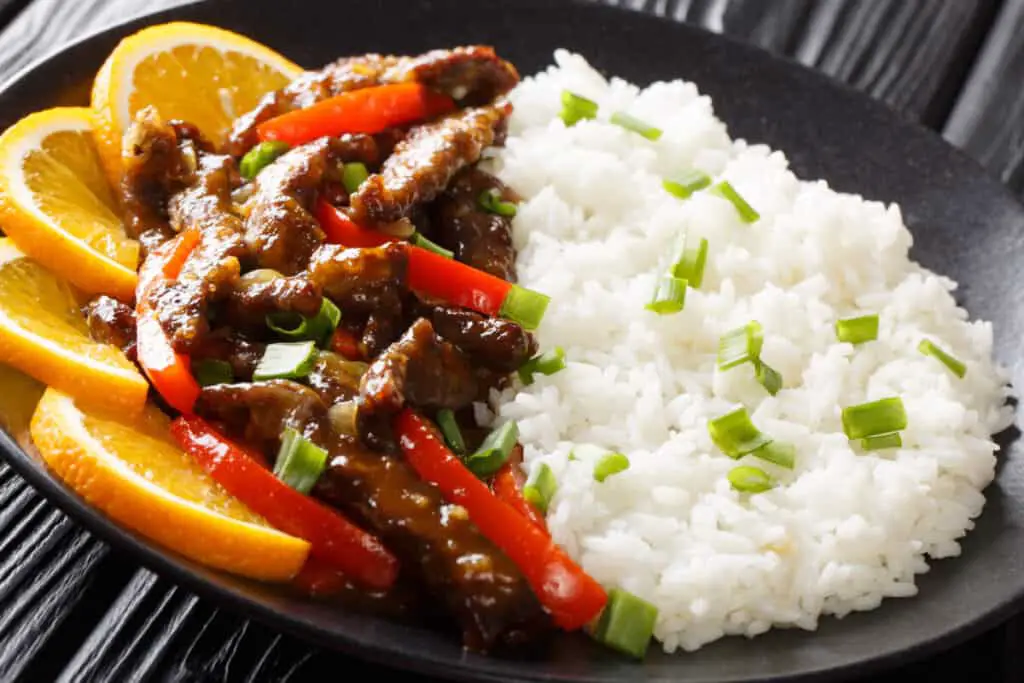
Cooling Rice Fully Before Storage
Many people don’t know why they shouldn’t put warm food into a refrigerator. Unfortunately, this tendency to store food incorrectly leads to more food poisoning cases and earlier spoilage of other food in the fridge.
Refrigerators are set to a temperature of below 40 degrees Fahrenheit. Adding fully cooled room-temperature food doesn’t alter this out of the safe zone, and the fridge is able to cool the food before the food heats the fridge. However, adding warm or hot food can raise the overall temperature of the fridge, especially around the hot food, putting everything else at risk of spoiling.
Cooling your rice fully is the first step to safe storage. If you plan on having leftovers, divide it to cool during your meal.
Spreading Rice On a Tray Or Dividing It to Cool
Rice can take a while to cool, particularly if you’ve made enough to meal prep for a few days. Cut down the counter time by dividing rice into separate Tupperware or individual containers so it can cool faster. Alternatively, spread all your rice on a baking tray with parchment or waxed paper so it can cool quickly.
This method is especially useful when making something like Spam Musubi . The flattened rice can be divided and prepared quickly, saving time and reducing the risk of you getting food poisoning if you’re making a large batch.
. The flattened rice can be divided and prepared quickly, saving time and reducing the risk of you getting food poisoning if you’re making a large batch.
Freezing Leftover Rice
Freezing leftover rice accomplishes two important tasks. First, it helps you avoid spoiled leftovers in the fridge if you’ve made too much rice. Second, it provides you with already portioned rice that will help you make several future meals without fear of food poisoning. If you’re feeling a little forgetful, use the frozen rice so you don’t need to worry about leaving anything out overnight!
Spreading rice on a tray is a perfect way to prep it for freezing . The cooling process should only take about 20 minutes, and then you can scoop it into plastic bags, lay them flat, and freeze a whole stack of portioned rice. Make sure to label different types of rice so you can identify them later. It will last for about two months in the fridge, and you don’t want to mix up short-grain rice and jasmine rice when you’re trying to make dinner.
. The cooling process should only take about 20 minutes, and then you can scoop it into plastic bags, lay them flat, and freeze a whole stack of portioned rice. Make sure to label different types of rice so you can identify them later. It will last for about two months in the fridge, and you don’t want to mix up short-grain rice and jasmine rice when you’re trying to make dinner.
Thawed frozen rice has the same fridge lifespan as freshly cooked rice. Don’t leave it in there for more than 3-4 days, and reheat the rice to 165 degrees Fahrenheit before eating. This rice will be perfect for cooking in soups, fried rice, or other hot recipes, so this shouldn’t be difficult.
How Do I Know If Rice is Spoiled?
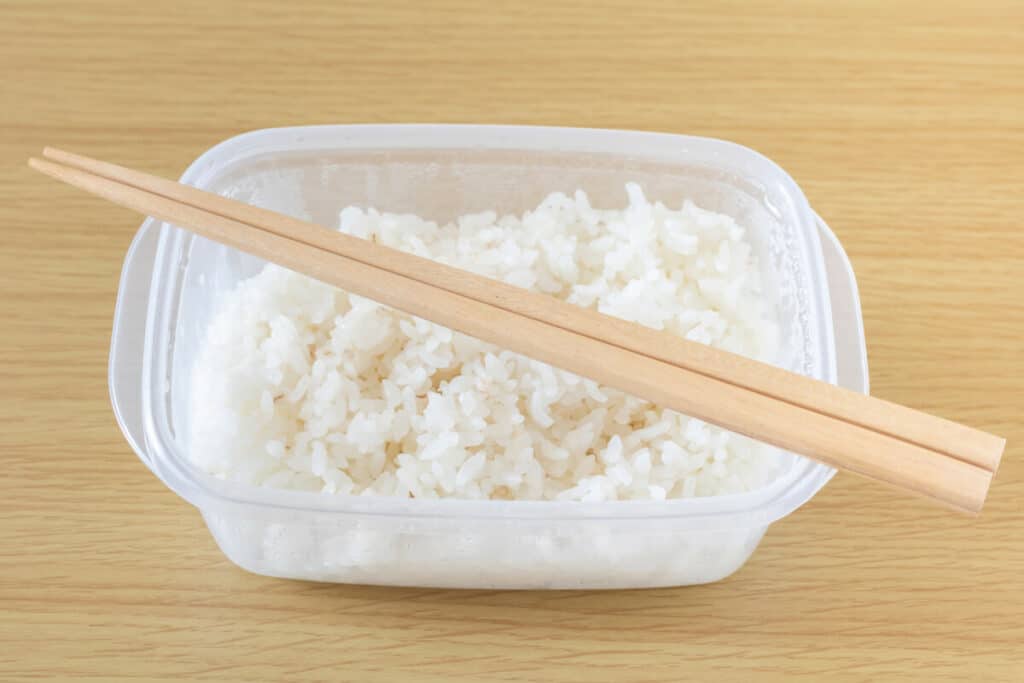
Are you reading this and realizing you’ve left some rice in the fridge or on the counter for a little longer than the recommended time? Are you wondering if all the fuss is still worth it and thinking you can just sniff the rice and chance it? Did you hear that you can just leave your rice in the rice cooker and it would be fine?
If so, then the following information is especially important for you to read. Don’t skip ahead.
Err On The Side Of Caution
It can be hard to tell if rice has spoiled. Remember that odor and discoloration come from a buildup of toxins and bacteria, so that buildup is starting long before there is enough for you to detect.
This is especially important for people that have lost their sense of smell or taste, or whose sense of smell or taste is impaired for any reason. Chemotherapy, colds, advanced age, and the after-effects of Covid-19 can all leave someone unable to detect the presence of bacteria or mold through anything but visuals. Unfortunately, these situations also make individuals particularly vulnerable to food poisoning (as I know from experience).
If you have any doubts, don’t eat it. If you have impaired smell or taste, adhere strictly to the safety timeline explained earlier in this article. If the rice has been out in the heat for over one hour, or at room temperature for two hours, do not risk becoming seriously ill just because you don’t want to waste food.
Bad Smells
If you open the container and gag, you shouldn’t eat the rice. This should be obvious, but it doesn’t hurt to emphasize the point.
Fishy, foul, sour, and rotten smells have no place in rice. Even fried rice shouldn’t smell too different from when it was initially put into the fridge. If it does, dispose of it immediately and try to take the trash outside so your home doesn’t start to smell bad, too.
Remember that this smell comes from a buildup of toxins. Recooking the rice with extra seasonings will not save it. It will just risk making people sick. Even a hint of foul odor is a sign that the rice should not be consumed.
Sour Smells
Any kind of sour or fermented smell is a red flag for rice. Even if it isn’t a bad or foul odor, the rice should not smell sour.
The only possible exceptions to this are when making rice wine, which has it’s own special process to avoid making something dangerous, sushi rice with vinegar, and when you’ve cooked brown rice.
Try to smell the brown rice after a few hours in the fridge so you have a reference for what it’s supposed to smell like. The nutty, stronger scent is different from white rice, but it should not smell offensive.
Sushi rice should have a distinct vinegary sour scent because it has vinegar mixed in. This is probably the safest rice to store since the vinegar and salt will inhibit bacterial growth, but it isn’t as popular reheated and you’re less likely to come across it.
Discoloration
Don’t eat rice that looks wrong. If it has any kind of grey, green, blue, or yellow discoloration, or any color that you did not intentionally put into the rice, dispose of it immediately. Rice might dry out a little during refrigeration, but at no point should it change appearance in other ways.
Discoloration could be mold, or it could be bacterial buildup. Either way, don’t eat it. Make sure it hasn’t spread to anything else in the fridge.
It Tastes Wrong
If you take a bite of leftover rice and it tastes “wrong,” spit it out and dispose of the rice. You may have encountered spoilage in the center that was not visible or strongly scented upon first inspection. This is one of the reasons that visually inspecting rice is not reliable.
Trust your gut. In the case of possible food poisoning, this saying becomes very literal.
You Get Sick
Food poisoning from rice usually shows up within 30 minutes to 6 hours. If you thought your leftovers tasted fine and you still got sick, be suspicious of the rice. Bacteria that cause food poisoning can be hard to detect, especially in food like fried rice that is seasoned and darker colored.
This is especially important if you have others in the house that could eat spoiled rice. While food poisoning leads to little more than bad days and embarrassing stories for most adults, that same sickness can be dangerous or deadly for young children, elderly adults, pregnant people, or anyone with a health condition that leaves them vulnerable.
Use caution, and throw out any questionable leftovers if you suspect you have food poisoning.
What Happens If I Eat Spoiled Rice?
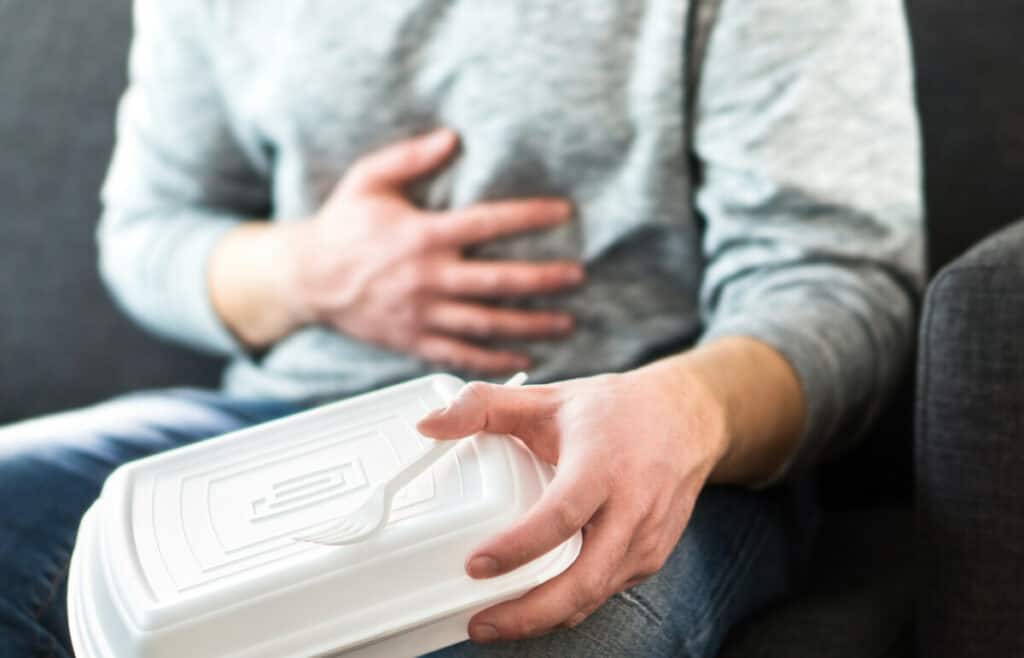
If you eat spoiled rice, you are at risk of getting food poisoning . The symptoms include nausea, vomiting, diarrhea, fever, and more, with severity ranging from an uncomfortable day to possible death.
. The symptoms include nausea, vomiting, diarrhea, fever, and more, with severity ranging from an uncomfortable day to possible death.
Food poisoning is more dangerous for young children, pregnant people, elderly adults, and anyone who is immunocompromised or has health conditions that could be impacted by this. Diabetic adults, for example, could experience dangerous side effects from food poisoning.
Remember that even if you are willing to take the risk of getting food poisoning, you should not risk the health of other individuals who might consume that food.
Is It Safer to Make Brown Rice Instead of White Rice?
Brown rice does not have a longer countertop lifespan than long-grain white, jasmine, or any other rice. Stick to the same 2-hour maximum on the counter, and 3-4 day maximum in the fridge.
Is Pre-Prepared Microwavable Rice A Safe Option?
Pre-prepared microwavable rice is a great option for people who tend to forget about their rice. These shelf-stable rice bowls allow for flexibility and are portioned out for each meal.
is a great option for people who tend to forget about their rice. These shelf-stable rice bowls allow for flexibility and are portioned out for each meal.
If you’re sick of food poisoning, you have a hard time detecting when food is spoiled or are simply absentminded sometimes, the convenience of these bowls might be worth the cost trade-off.


